高中英语虚拟语气详细讲解大全
(完整版)英语虚拟语气语法归纳总结
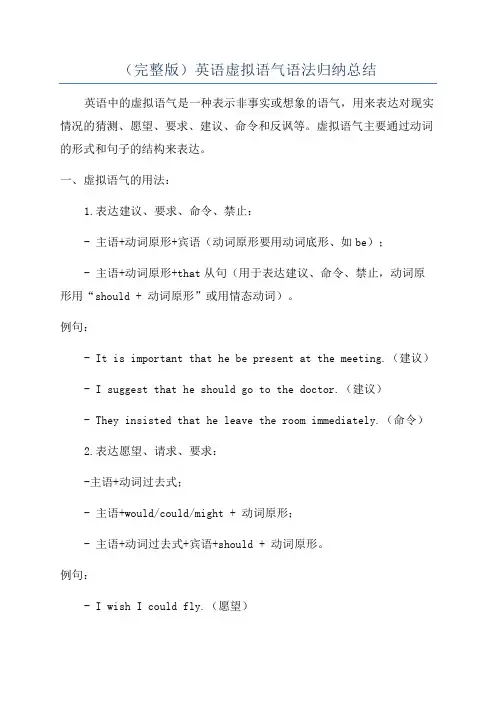
(完整版)英语虚拟语气语法归纳总结英语中的虚拟语气是一种表示非事实或想象的语气,用来表达对现实情况的猜测、愿望、要求、建议、命令和反讽等。
虚拟语气主要通过动词的形式和句子的结构来表达。
一、虚拟语气的用法:1.表达建议、要求、命令、禁止:- 主语+动词原形+宾语(动词原形要用动词底形、如be);- 主语+动词原形+that从句(用于表达建议、命令、禁止,动词原形用“should + 动词原形”或用情态动词)。
例句:- It is important that he be present at the meeting.(建议)- I suggest that he should go to the doctor.(建议)- They insisted that he leave the room immediately.(命令)2.表达愿望、请求、要求:-主语+动词过去式;- 主语+would/could/might + 动词原形;- 主语+动词过去式+宾语+should + 动词原形。
例句:- I wish I could fly.(愿望)- I would appreciate it if you could help me.(请求)3.表示虚拟条件:- If条件从句中的谓语动词用过去完成时,主句用would/should/might/could + have + 过去分词;- If条件从句中的谓语动词用过去时,主句用would/should/could + 动词原形。
例句:- If I had known his phone number, I would have called him.(虚拟条件)- If you had listened to me, we could have finished the project earlier.(虚拟条件)4.表达建议、要求、祝愿:- If only内部称述 + 主语 + 过去式。
高中英语之虚拟语气详细讲解
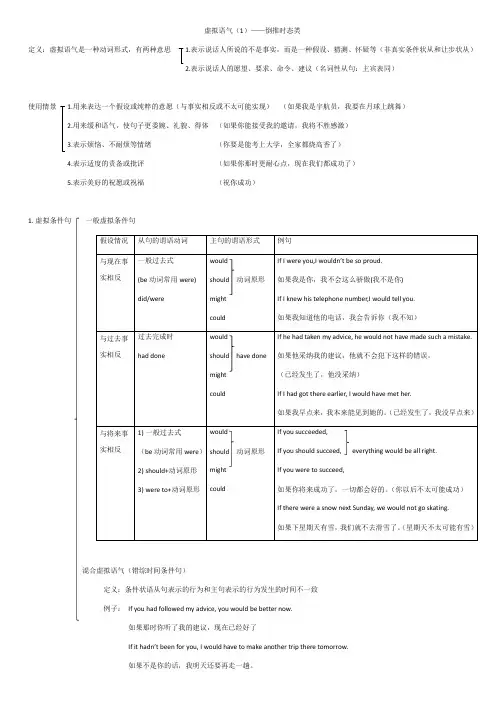
虚拟语气(1)——倒推时态类定义:虚拟语气是一种动词形式,有两种意思 1.表示说话人所说的不是事实,而是一种假设、猜测、怀疑等(非真实条件状从和让步状从)2.表示说话人的愿望、要求、命令、建议(名词性从句:主宾表同)使用情景 1.用来表达一个假设或纯粹的意愿(与事实相反或不太可能实现)(如果我是宇航员,我要在月球上跳舞)2.用来缓和语气,使句子更委婉、礼貌、得体(如果你能接受我的邀请,我将不胜感激)3.表示烦恼、不耐烦等情绪(你要是能考上大学,全家都烧高香了)4.表示适度的责备或批评(如果你那时更耐心点,现在我们都成功了)5.表示美好的祝愿或祝福(祝你成功)1.虚拟条件句一般虚拟条件句混合虚拟语气(错综时间条件句)定义:条件状语从句表示的行为和主句表示的行为发生的时间不一致例子:If you had followed my advice, you would be better now.如果那时你听了我的建议,现在已经好了If it hadn’t been for you, I would have to make another trip there tomorrow.如果不是你的话,我明天还要再走一趟。
If you had studied hard before,you would be a college student now.如果你以前努力学习的话,你现在就是大学生了。
省略+倒装当虚拟条件句的谓语动词中含有were,should,had时,if可以省略,并将were,should,had提前于句首,变为倒装句。
如果虚拟条件句是否定句,not 保留在原处If he should agree to go there, we should send him there.= Should he agree to go there,we should send him there.If she were there,she would agree with us.= Were she were, she would agree with us.If he had learnt about computers,we would have hired him.= Had he learnt about computers,we would have hired him.含蓄虚拟条件句定义:有时为了表达的需要,在虚拟语气中并不总是出现if引导的条件状语从句,而是通过其他手段来代替条件从句分类:1) but for....=(If it+be not for) ;without;Without your help ,we couldn’t have finished the work ahead of time.= But for your help,we couldn’t have finished the work ahead of time.= If it hadn’t been for your help,we couldn’t have finished the work ahead of time.没有你的帮助,我们不可能完成任务。
高中英语虚拟语气(全)
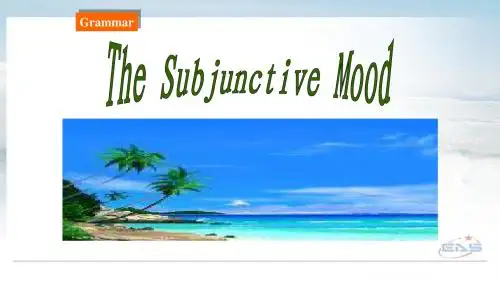
7. If you ___________ had started (start) the work earlier, you ___________________ would have finished (finish) it by now. 8. If wehadn’t __________ relied (not rely) on our own strength would have died (die) of starvation. we ________________ known (know) your address, I ________ would 9. If Ihad __________ ____________(write) to you then. have written have come been (not be) busy, I would 10. If I hadn’t ___________ ____________ (come) to help. had started (start) out five minutes later, 11. If we ___________ we would __________________ have missed (miss) the train. would have met (meet) the famous 12. You _______________ had come (come) yesterday. scientist if you __________
高中必备知识点解析虚拟语气的形式与用法
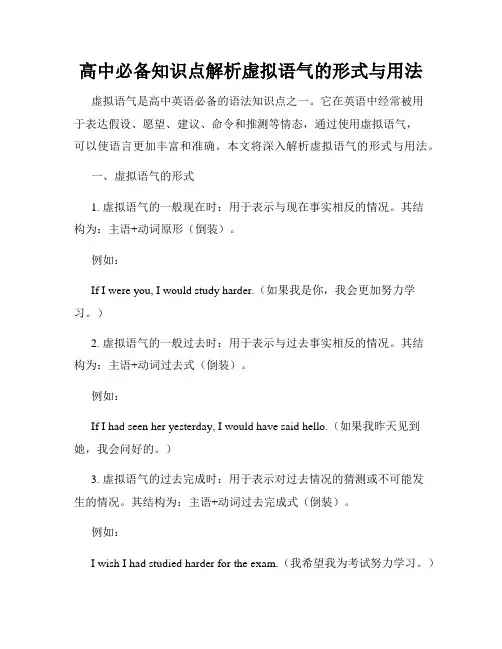
高中必备知识点解析虚拟语气的形式与用法虚拟语气是高中英语必备的语法知识点之一。
它在英语中经常被用于表达假设、愿望、建议、命令和推测等情态,通过使用虚拟语气,可以使语言更加丰富和准确。
本文将深入解析虚拟语气的形式与用法。
一、虚拟语气的形式1. 虚拟语气的一般现在时:用于表示与现在事实相反的情况。
其结构为:主语+动词原形(倒装)。
例如:If I were you, I would study harder.(如果我是你,我会更加努力学习。
)2. 虚拟语气的一般过去时:用于表示与过去事实相反的情况。
其结构为:主语+动词过去式(倒装)。
例如:If I had seen her yesterday, I would have said hello.(如果我昨天见到她,我会问好的。
)3. 虚拟语气的过去完成时:用于表示对过去情况的猜测或不可能发生的情况。
其结构为:主语+动词过去完成式(倒装)。
例如:I wish I had studied harder for the exam.(我希望我为考试努力学习。
)二、虚拟语气的用法1. 表达假设与条件:If I were you, I would travel around the world.(如果我是你,我会环游世界。
)I wish I had a million dollars.(我希望我有一百万美元。
)2. 表达愿望与建议:I wish you would stop smoking.(我希望你戒烟。
)It's important that she arrive on time.(她按时到达很重要。
)3. 表达命令与要求:The teacher ordered that the students be quiet.(老师要求学生们保持安静。
)She insisted that he leave immediately.(她坚持要他立刻离开。
)4. 表达推测与猜测:He looks as if he were sick.(他看起来像是生病了。
高中虚拟语气用法解析
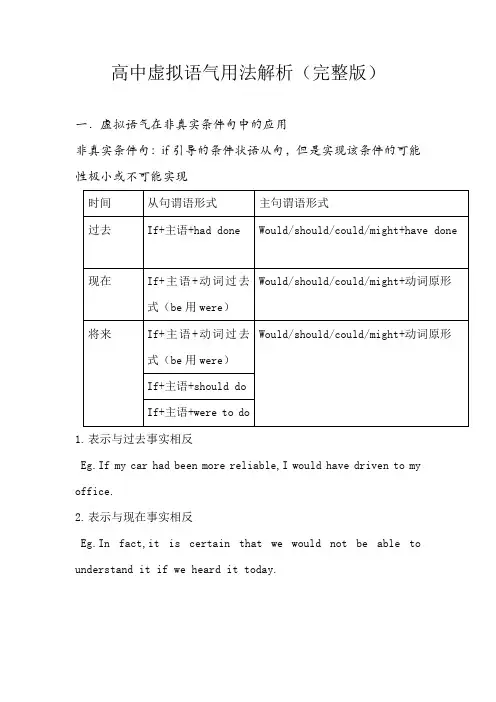
高中虚拟语气用法解析(完整版)一.虚拟语气在非真实条件句中的应用非真实条件句:if引导的条件状语从句,但是实现该条件的可能性极小或不可能实现1.表示与过去事实相反Eg.If my car had been more reliable,I would have driven to my office.2.表示与现在事实相反Eg.In fact,it is certain that we would not be able to understand it if we heard it today.3.表示与将来事实相反Eg.If you succeed,everything would be all right.Grace doesn't want to move to New York because she thinks if she were to live there,she wouldn't be able to see her parents.4.注意事项(1)W as不可以替代were,虚拟语气中,从句中be动词只有were(2)错综时间条件句:条件句的行为和主句行为发生的时间不一致,动词的形式按照主句和从句各自的时间调整。
Eg.If he had listened to me, he would not be in such trouble now. If it had not been raining too much, the crops would be growing much better.(3)虚拟条件句中的谓语动词含有were/ should /had 时,if可省略,而将were/ should /had 置于主语前面Eg.What would have happened had Bob walked farther as far as the river bank?Should he agree to go there, we should send him there. Were it Sunday tomorrow, we should go to the great wall.两个固定搭配:①Were it not for 要不是...就②Had it not been for 要不是...就If it were not for (Were it not for)the bad weather now, we would go to the park to fly kites.If it had not been for(Had it not been for) the bad weather yesterday, we would have gone to the park to fly kites. (4)含蓄虚拟条件句:有时假设的情况不是以if条件句来表示。
高中英语虚拟语气讲解(很完整的总结)
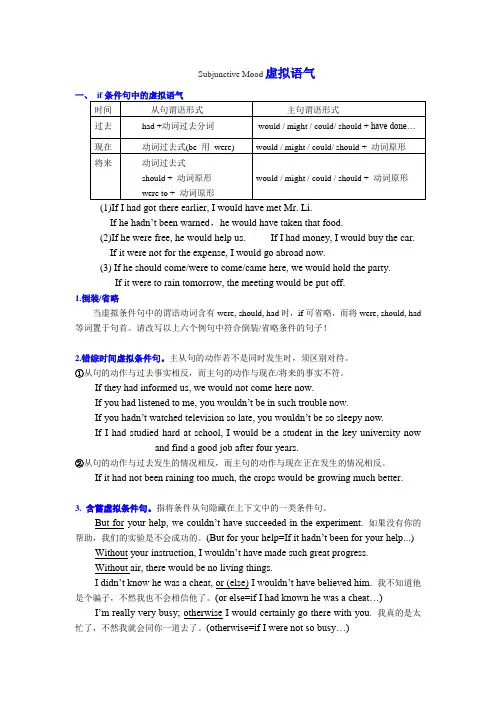
Subjunctive Mood虚拟语气(1)If I had got there earlier, I would have met Mr. Li.If he hadn’t been warned,he would have taken that food.(2)If he were free, he would help us. If I had money, I would buy the car.If it were not for the expense, I would go abroad now.(3) If he should come/were to come/came here, we would hold the party.If it were to rain tomorrow, the meeting would be put off.1.倒装/省略当虚拟条件句中的谓语动词含有were, should, had时,if可省略,而将were, should, had 等词置于句首。
请改写以上六个例句中符合倒装/省略条件的句子!2.错综时间虚拟条件句。
主从句的动作若不是同时发生时,须区别对待。
①从句的动作与过去事实相反,而主句的动作与现在/将来的事实不符。
If they had informed us, we would not come here now.If you had listened to me, you wouldn’t be in such trouble now.If you hadn’t watched television so late, you wouldn’t be so sleepy now.If I had studied hard at school, I would be a student in the key university now and find a good job after four years.②从句的动作与过去发生的情况相反,而主句的动作与现在正在发生的情况相反。
高中英语语法课件-虚拟语气(全)(共55张PPT)详解
实战练习 5
2001年1月大学英语四级题目: Some women a good salary in a job instead of staying home, but they decided not to work for the sake of the family. A. must make B. should have made C. would make D. could have made
解题思路
这是一道错综时间虚拟条件句。 在本句中,从句是对过去发生的事情进 行假设,主句是对现在情况的假设。 译文:当你掉下来时,如果不是我在梯 子下面把你接住,恐怕你现在就不会笑 了。选A
实战练习 2
If you had taken your medicine yesterday, you ___ well now. A. are B. had been C. would be D. were 正确答案: C
祈使语气主要用于祈使句。 e.g. Get out of here! 虚拟语气
II. 什么是虚拟语气?
虚拟语气是一种特殊的动词形式,表示说话人 所说的话不是事实,而是想象、假设、建议、 打算、意见、愿望、怀疑、推测、喜悦等等。 e.g. If we had met her last night, we would have told her what had happened. 如果我们昨晚见到她,我们就会告诉她发生了 什么事。 (实际上,我们并没有见到她,也没有告诉她 所发生的事。)
注意!!!
如果条件从句是否定式,倒装时只能把 not 放在主语之后,不能用缩写式把not 放在主语之前。 e.g. Had you not told me about the matter, I should never have known the whole thing. (不能说:Hadn’t you told me…)
高中语法解析虚拟语气
高中语法解析虚拟语气虚拟语气是语法中的一个重要概念,它用于表达与事实相反的假设、愿望、建议、命令等。
在高中英语学习中,学生们需要掌握虚拟语气的用法以及对应的句型结构。
本文将详细解析高中语法中的虚拟语气,并提供一些练习题来帮助学生巩固掌握。
一、虚拟语气的用法1. 表达与事实相反的假设虚拟语气常用于虚构的情况、与事实相反的假设,例如:- If I were rich, I would buy a big house.- If she had studied harder, she would have passed the exam.在这两个句子中,使用了虚拟语气来表达与现实情况相反的假设,即作者并不是富有的、她也没有努力学习。
2. 表达愿望当我们想表达自己的愿望、期望时,可以使用虚拟语气,例如:- I wish I could travel around the world.- I wish it would stop raining.这两个句子中,使用了虚拟语气来表达作者的愿望,他们希望能够环游世界、希望雨停。
3. 表达建议在给予他人建议时,也可以使用虚拟语气,例如:- I suggest that he go to the doctor.- It is recommended that she take a break.这两个句子中,使用了虚拟语气来表达建议,作者建议他去看医生、建议她休息一下。
4. 表达命令或要求虚拟语气还可以用于表达命令、要求等,例如:- The teacher insisted that the students be on time.- The boss demanded that the work be completed by Friday.这两个句子中,使用了虚拟语气来表达命令、要求,老师坚持要求学生准时、老板要求工作在周五之前完成。
二、虚拟语气的句型结构1. 谓语动词在虚拟语气中的形式变化在虚拟语气的句子中,谓语动词的形式会发生变化。
高中英语虚拟语气用法详解
⾼中英语虚拟语⽓⽤法详解虚拟语⽓语⽓(mood)也是动词的⼀种形式变化。
这和中⽂中的语⽓是不⼀样的。
它表⽰说话者对所指的动词或状态所持的态度,⽽且,在谓语动词上有所体现,⽽中⽂没有体现。
语⽓可分为三种:陈述语⽓、祈使语⽓和虚拟语⽓。
虚拟语⽓(the Subjunctive Mood)表⽰说的话不是事实,或者是不可能发⽣的情况,⽽是⼀种愿望、建议或与事实相反的假设等。
⼀、虚拟条件句1.主句和从句都与现在事实相反时,从句⽤⼀般过去时,be的形式要⽤were,主句⽤would/could/ should/might+不定式⼀般式。
If I were you, I should not go with him.2.主句和从句都与过去事实相反时,从句⽤过去完成时,主句⽤would/should/could/might+不定式完成式。
If I had tried hard last term, I would have succeeded.3.当主句和从句都与将来事实相反,或指不⼤可能发⽣的事的时候,从句和与现在事实相反的从句时态相同,或⽤should/were to+不定式⼀般式,主句和与现在事实相反的主句相同。
If it rained/were to rain/should rain tomorrow, the match would be put off.4.在使⽤虚拟条件句时,由于语⾔环境的千差万别,各种时间关系混合使⽤是很常见的。
如果逻辑上讲得通,主句和从句的动词时态可进⾏各种各样的搭配。
If it hadn't rained those days, (从句与过去事实相反)1 work would be finished next week. (主句与将来事实相反)2.here wouldn't be any water in the river now. (主句与现在事实相反)⼀、语⽓及其种类1.语⽓(mood)语⽓是⼀种动词形式,表⽰讲话⼈对某⼀⾏为或事情的看法和态度。
虚拟语气的种类及用法详解
虚拟语气的种类及用法详解虚拟语气是英语中一种特殊的语法现象,用来表达与事实相反、与现实相悖或假设情况下的语气。
虚拟语气分为几种不同的形式,每种形式都有其特定的用法和意义。
本文将详细介绍虚拟语气的种类以及相应的用法。
一、虚拟语气的种类1. 条件虚拟语气(the conditional subjunctive)条件虚拟语气用来表达假设情况下的语气,指不太可能或不可能发生的情况。
具体形式上,条件虚拟语气由"if"引导的句子中使用"were"代替"was",虚拟语气的主要动词常为动词不定式。
例句:If I were a bird, I would fly to the highest mountain.(如果我是只鸟,我就飞到最高的山上。
)2. 建议虚拟语气(the subjunctive of suggestion)建议虚拟语气用于表达对他人的建议、命令或要求。
通常以动词原形出现。
需要注意的是,在现代英语中,建议虚拟语气的使用已经相对较少。
例句:I suggest that he eat more fruits and vegetables.(我建议他多吃水果和蔬菜。
)3. 祝愿虚拟语气(the subjunctive of wish)祝愿虚拟语气用来表达对与现实相反的愿望或希望。
主要由"as if"或"as though"引导的从句中使用虚拟语气形式的动词。
例句:I wish I were taller.(但事实上我并不高。
)4. 值得虚拟语气(the subjunctive of value)值得虚拟语气用于表达对某事的怀疑、否认、批评等感觉或观点。
常以"should"引导的从句中使用虚拟语气形式的动词。
例句:It is strange that she should arrive so late.(她竟然这么晚才到,真是奇怪。
- 1、下载文档前请自行甄别文档内容的完整性,平台不提供额外的编辑、内容补充、找答案等附加服务。
- 2、"仅部分预览"的文档,不可在线预览部分如存在完整性等问题,可反馈申请退款(可完整预览的文档不适用该条件!)。
- 3、如文档侵犯您的权益,请联系客服反馈,我们会尽快为您处理(人工客服工作时间:9:00-18:30)。
高中英语虚拟语气详细讲解虚拟语气什么是虚拟语气?是的,我们要学习虚拟语气就必须先弄明白它的概念。
虚拟语气包含两种:一种指与事实相反或不可能发生。
“虚拟条件句+虚拟主句”的结构都属于这一类;even if、even though、as if、as though引导的状语中如果需要用到虚拟语气也属于这一类;wish、would rather后面接的宾语从句表示不可能实现的愿望,还是属于这一类。
另一种指与事实实际是否发生没有直接关系。
如和suggest、order、demand等表示建议、命令、要求等相关的名词性从句都属于这一类。
大家知道以上两类虚拟语气后,我们就从从句的角度来系统学习虚拟语气。
紧跟小简老师的步伐哦!一. 虚拟条件句中的虚拟语气1、表示与现在事实相反的情况从句:If+主语+did(be动词用were)主句:主语+ should/would/might/could+doIf I were you,I would take an umbrella.如果我是你,我会带把伞。
(事实:我不可能是你)If I knew his telephone number,I would tell you.如果我知道他的,我就会告诉你。
(事实:不知道)If there were no air or water,there would be no living things on the earth.如果没有水和空气,地球上就不会有生物。
(事实:地球上既有空气也有水)2、表示与过去事实相反的情况从句:If+主语+had+done主句:主语+should/would/might/could+have doneIf I had got there earlier,I should/would have met her. 如果我早到那儿,我就会见到她。
(事实:去晚了)If he had taken my advice,he would not have made such a mistake.如果他听我的劝告的话,就不会犯这样的错误了。
(事实:没有听我的话)3、表示与将来事实相反的情况从句:①if+主语+were to do②if+主语+should+do③if+主语+过去式(be动词用were)主句:主语+should/would/might/could+doIf he should come here tomorrow,I would talk to him.如果他明天来这儿的话,我就跟他谈谈。
(事实:不可能来)If there were a heavy snow next Sunday,we would go skating.如果下周日下大雪,我们就去滑冰。
(事实:不可能下雪)If she were to be here next Monday,I would tell her about the matter.如果她下周一来这儿的话,我就会告诉她这件事的始末。
(事实:不可能来)注意事项:①错综时间句:即虚拟条件状语从句与虚拟主句中谓语动作的时间不一致。
If I had worked hard at school,I would be an engineer,too.如果我在学校学习刻苦的话,我现在也会成为一个工程师了。
If they had informed us,we would not come here now.如果他们通知过我们的话,我们现在就不会来这里了。
If he knew her,he would have greeted her that day.如果他认识她的话,他肯定会去问候她了。
②虚拟条件句中的省略:当虚拟条件句的谓语动词含有were,should,had 时,if 可以省略,这时条件从句要用倒装语序,即把were,should,had等词置于句首,这种多用于书面语。
Should he agree to go there,we would send him there.要是他答应去的话,我们就派他去了。
Were she here,she would agree with us.如果她在这儿的话,她会同意我们的。
Had he learnt about computers,we would have hired him to work here.如果他懂一些电脑知识的话,我们已经聘用他来这里工作了。
③用其它形式表达虚拟条件:虚拟条件状语从句有时不表达出来,只暗含在副词、介词短语、上下文或用其它方式表示出来。
如without…,but for…(要不是...)等。
But for his help,we would be working now.要不是他的帮助,我们还会在工作呢。
Without your instruction,I would not have made such great progress.要是没有你的指导,我不会取得如此大的进步。
We didn't know his telephone number,otherwise we would have telephoned him.我们不知道他的,否则我们就会给他打。
④在虚拟语气的从句中,动词be的过去时态一律用were,不用was。
If I were you,I would go to look for him.如果我是你,就会去找他。
⑤在虚拟条件句中,should/would/might/could四个词只能用should;在虚拟主句中,主语只有是第一人称时,才能用should。
If I had got there earlier,I should/would have met her.如果我早到那儿,我就会见到她。
If he had got there earlier, he would have met her.如果我早到那儿,我就会见到她。
二. 名词性从句中的虚拟语气1、表达和建议、要求、命令、主等含义相关的名词性从句,一律用主语+should+动词原形(should可以省略)结构。
具体涉及到这些动词以及它们的名词形式:一坚持(主):insist二命令:order,command三要求:require,request,demand四建议:suggest,advise,propose,recommend例如:It was suggested that he(should)join in the club activities.(主语从句)I suggested that he(should)join in the club activities.(宾语从句)My suggestion was that he(should)join in the club activities.(表语从句)I had an suggestion that he(should)join in the club activities.(同位语从句)这四句话表达同一个意思:我建议他加入这个俱乐部的活动。
2、表示重要性、必要性、吃惊等时,一律用it is+形容词+that+主语+should+动词原形(should可以省略)结构。
例如:It's important that you (should) study English hard.努力学习英语是很重要的。
It's necessary that you (should) praise your students as much as possible.尽可能多的表扬你的学生是有必要的。
It is strange that she (should) not have been invited.很奇怪她竟然没有被邀请。
3. ①wish 后面所跟的宾语从句,其谓语动词用虚拟语气(意为“要是/但愿…就好了”),其形式主要有三种:表示对现在情况的虚拟:wish+一般过去时的宾语从句表示对过去情况的虚拟:wish+ 过去完成时的宾语从句表示对将来情况的虚拟:wish+ would/could+动词原形I wish it were spring all year round.我希望一年四季都是春天。
I wish it would be fine tomorrow.我希望明天天气好。
She wished she had stayed at home then.她希望她当时待在家里。
if only 后接从句也用虚拟语气,其形式与wish的用法一致。
②would rather 后面所跟的宾语从句,其谓语动词用虚拟语气(意为“宁愿......”),其形式主要有两种:表示对现在/将来情况的虚拟:wish+一般过去时的宾语从句表示对过去情况的虚拟:wish+ 过去完成时的宾语从句三. 其它从句中的虚拟语气1、虚拟语气用在状语从句中①由as if 或as though 所引导的方式状浯从句,若从句与事实相反,则要用虚拟语气。
其形式如下:主句+as if/ though +主语+一般过去时(从句的动作与现在事实相反)主句+as if/ though +主语+would/could+动词原形(从句的动作与将来事实相反)主句+as if/ though +主语+过去完成时(从句的动作与过去事实相反)He talks as if he knew all about it.他说起来好像知道这件事的全部一样。
She speaks English well as if she had studied in America.她说英语很好,好像过去在美国待过一样。
He learns English so hard as if he would go abroad.他学英语如此努力,好像他要出国一样。
②由even if 或even though 所引导的让步状语从句,若从句与事实相反,则从句和主句都要用虚拟语气。
其形式如下:主句+even if/ though +主语+一般过去时(从句的动作与现在事实相反)主句+even if/ though +主语+would/could+动词原形(从句的动作与将来事实相反)主句+even if/ though +主语+过去完成时(从句的动作与过去事实相反)Even if you weren't her son, she would treat you like this.即使你不是她的儿子,她也会这样对待你的。
I would have married her even if she had been penniless.即使她身无分文,我也会和她结婚。
